|
|
|
Sort Order |
|
|
|
Items / Page
|
|
|
|
|
|
|
| Srl | Item |
| 1 |
ID:
152551


|
|
|
|
|
| Summary/Abstract |
This article considers contemporary class inequalities and how they might shape a progressive politics in the UK. Drawing on findings from the BBC Class Survey, it outlines changes in the class structure, class mobility and class identities. It is argued that the class structure is increasingly polarised and fragmented, with a wealthy elite, a vulnerable precariat and fragmented middle and working classes in between. Declining upward social mobility is a source of anxiety for middle-class and working-class parents alike. Class identification, especially working-class identification, has weakened over time, although class snobbery is far from dead. Class has changed and the class basis of politics is changing now too. A progressive politics is possible if the political parties of the centre-left appeal to the majority of the electorate rather than one class, acknowledge common concerns and worries and appeal to shared hopes and dreams that straddle class boundaries.
|
|
|
|
|
|
|
|
|
|
|
|
|
|
|
|
| 2 |
ID:
152557


|
|
|
|
|
| Summary/Abstract |
Attempts at a Labour–Liberal Democrat Progressive Alliance came to nothing prior to the 1997 general election. The original idea of progressivism, first mooted in Britain in 1896, was an American one. Suggestions for a progressive alliance in the UK came from Lloyd George in 1914, and then again in 1931, each time with little effect. Nothing emerged after 1945 until the Lib–Lab pact negotiated by Callaghan and Steel in 1977, which led to electoral misfortune for both and the rise and fall of the SDP. In 2010 a coalition between the Lib Dems (under Clegg) and the Conservatives was always much the more likely option. Most Labour people no longer saw the Lib Dems as a party of the left. The Coalition Agreement in 2010 showed the idea of an alliance to be a centrist, elitist one with little grass-roots support. Such an alliance would flourish through abstract pressure groups rather than popular democracy, especially with a Labour party led by Corbyn. In the US and the UK, progressivism went badly wrong in its politics: Theodore Roosevelt's New Nationalist campaign of 1912 divided American reformers fatally, as did Lloyd George's postwar Coalition in Britain after 1918. Now, even after Brexit, a progressive alliance seems further away than ever. The story of the ‘Progressive Dilemma’ remains one of unrealistic projects, invariably disappointed.
|
|
|
|
|
|
|
|
|
|
|
|
|
|
|
|
| 3 |
ID:
152565
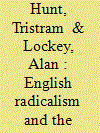

|
|
|
|
|
| Summary/Abstract |
The rise of political nationalism in the early twenty-first century threatens to subsume the ‘progressive dilemma’ as identified by David Marquand. The labourist tradition is collapsing culturally, the liberal tradition intellectually. In the face of a new politics of nativism across Europe and America, the labour movement needs to put the debate over the progressive dilemma behind it and find a new source of philosophical inspiration in the English radical tradition.
|
|
|
|
|
|
|
|
|
|
|
|
|
|
|
|
| 4 |
ID:
152549
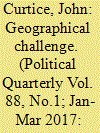

|
|
|
|
|
| Summary/Abstract |
Labour won fewer seats in 2015 than in 2010, even though its share of the vote increased. The decline in representation was occasioned by three features of the electoral geography of the 2015 contest—a collapse in Labour support in Scotland, a particularly strong Conservative advance in marginal seats and the fact that in England and Wales Labour's vote rose most strongly in seats that the party already held. As a result, Labour's vote became markedly less efficiently distributed than that of the Conservatives—a development that could make it very difficult for the party to win an overall majority at the next election. Meanwhile, the redrawing of constituency boundaries that is currently in train will make winning a majority even more difficult. However, the next election could well produce a hung parliament, and the party should be prepared for that eventuality.
|
|
|
|
|
|
|
|
|
|
|
|
|
|
|
|
| 5 |
ID:
152561


|
|
|
|
|
| Summary/Abstract |
This article analyses the political crisis faced by the centre-left, not just in the UK but throughout the Western world, with few exceptions (Canada). The Liberal Democrat party has been a victim of that crisis, though there are encouraging signs of recovery and there is scope for a wider realignment on the centre-left.
|
|
|
|
|
|
|
|
|
|
|
|
|
|
|
|
| 6 |
ID:
152553


|
|
|
|
|
| Summary/Abstract |
This article examines changing patterns of voting for parties on the left in the UK and Europe. It shows that while combined support for social-democratic, left and Green parties remains strong, the composition of the left's electorate has radically changed. Increasingly, left parties rely on a coalition of new middle-class voters and traditional and new working-class constituencies. This coalition is relatively cohesive on questions of economic redistribution, but divided on social and cultural issues. Recent instability in Labour's electoral coalition reflects broader structural trends facing left parties across Europe.
|
|
|
|
|
|
|
|
|
|
|
|
|
|
|
|
| 7 |
ID:
152562
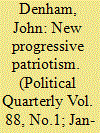

|
|
|
|
|
| Summary/Abstract |
The need to hold capital to account and to bend markets to the common good is as powerful as ever, yet it is becoming steadily harder to create an electoral or political majority for such an idea in societies that are fractured and divided. The fundamental bond between voters and parties depends on political identity relationships; old ones are fading, new ones need to be created. The most dynamic politics in advanced capitalist societies are those of nation, people and place. The strategic challenge for the left is to create a new progressive patriotism that can embed radical ideas in a common sense of national purpose.
|
|
|
|
|
|
|
|
|
|
|
|
|
|
|
|
| 8 |
ID:
152548
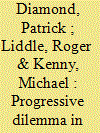

|
|
|
|
|
| Summary/Abstract |
This special edition reflects on the contemporary relevance of the insights and concerns of David Marquand's book The Progressive Dilemma. In this Introduction, the editors set the scene for these reflections. They consider the structural changes that have occurred in politics since the 1990s: the impact of globalisation, the erosion of class identities, the rise of ‘identity politics’ and the continued fragmentation of the party system. There has been no reconciliation between the parties of the centre-left, nor any re-examination of the ‘liberal tradition’ and the potential for a new synthesis with revisionist social democracy. On the one hand, Corbynism is a radicalised metropolitan species of liberalism, while on the other there are plenty in Labour who stress the need for the party to re-engage with the traditional, socially conservative values of the working class in a new ‘postliberal’ appeal. Yet the authors argue that those who broadly identify with progressive causes in British politics—animated by the various overlapping strands of social liberalism, social democracy and liberal socialism—have still to work out how to address the historic failings that Marquand so eloquently exposed, to create a new and inspiring intellectual vision that unites and energises the left and centre-left.
|
|
|
|
|
|
|
|
|
|
|
|
|
|
|
|
| 9 |
ID:
152567
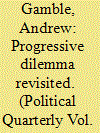

|
|
|
|
|
| Summary/Abstract |
In his book of the same title, David Marquand identified the progressive dilemma faced by many intellectuals since the beginning of the twentieth century as a question of whether it was better to work through a political party or through civil society to achieve reform. This dilemma was sharpened by the emergence of the Labour party as the main challenger to the Conservatives, because the party was so closely identified with the defence of a particular interest. This hindered the creation of the kind of broad electoral coalition that could win general elections. Throughout most of its history, Labour has failed to realise its promise and sustain reforming governments. In this article, the history of the Labour party over the past hundred years is outlined, in particular the three cycles 1931–51, 1951–79 and 1979–2010 and the divisions and recriminations that have followed each period in government. The current predicament of the party is then briefly assessed.
|
|
|
|
|
|
|
|
|
|
|
|
|
|
|
|
| 10 |
ID:
152558
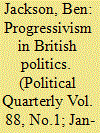

|
|
|
|
|
| Summary/Abstract |
This article argues that a return to the history of progressive political thought can help us to think afresh about what a renewed centre-left politics might look like today. The article identifies some significant aspects of this history that attracted little attention in earlier debates over the British progressive tradition—in particular, debates about social ownership, nationalism and distributism. This revisionist history of British progressivism points the way towards some common ideological ground that could provide a starting point for a new dialogue between different ‘progressive’ political parties and interests.
|
|
|
|
|
|
|
|
|
|
|
|
|
|
|
|
| 11 |
ID:
152550


|
|
|
|
|
| Summary/Abstract |
Labour's current problems are the culmination of long-term trends flowing from the rising cost of tax-funded services and welfare and voters’ mounting resistance to higher taxes to pay for them. As a result of this, there is now a big gulf between the attitudes of Labour party members, and in particular the supporters of Jeremy Corbyn, and Labour voters—and an even wider gulf with the extra voters Labour needs to win a future election. This gulf is also wide in relation to a range of other issues, including immigration, education and economic ideology. For Labour to return to government, it needs not just to narrow the gulf in policy, but to persuade voters of its ‘valence’ virtues of trust and competence—qualities in relation to which Labour currently lags the Conservatives by large margins.
|
|
|
|
|
|
|
|
|
|
|
|
|
|
|
|
| 12 |
ID:
152555


|
|
|
|
|
| Summary/Abstract |
Since the 1980s the Scottish National Party has presented its political project in progressive terms, but this created a twin dilemma: in order to achieve independence, the SNP needed to win political power, and in order to achieve political power it had to win an election, and orthodoxy dictated that winning elections in Scotland involved a centre-left platform. But the two have often been in conflict, as is clear as the SNP approaches its tenth anniversary in devolved government and agitates for another referendum.
|
|
|
|
|
|
|
|
|
|
|
|
|
|
|
|
| 13 |
ID:
152563


|
|
|
|
|
| Summary/Abstract |
Unless Labour in tandem with other parties of the parliamentary left offers a modernised Keynesian alternative to the neoliberal economic policies of austerity embraced across Europe, there is no prospect of winning again or defeating the right-wing populism eating into our voter base.
|
|
|
|
|
|
|
|
|
|
|
|
|
|
|
|
| 14 |
ID:
152560


|
|
|
|
|
| Summary/Abstract |
Jeremy Corbyn's election and re-election as Labour leader, together with the emergence of a new Conservative Prime Minister committed to Brexit, has led to renewed speculation about the possibility of a new party appealing to the ‘politically homeless’ in the centre and centre-left of British politics. This article draws lessons from the SDP experience in the early 1980s. Are the structural conditions more favourable to the progressive centre-left now than they were then? Is there the sociological, electoral and ideological space for a new party? Does first past the post remain an insuperable barrier to an electoral breakthrough? From whom and in what circumstances might the leadership for a new party come? For all the depth of Labour's current problems, a new party seems an unlikely immediate prospect. In 1981, the SDP made a major miscalculation about the irreversibility of Labour's decline. However, the process of fragmentation in British politics seems set to continue.
|
|
|
|
|
|
|
|
|
|
|
|
|
|
|
|
| 15 |
ID:
152566


|
|
|
|
|
| Summary/Abstract |
The left needs a fundamental rethinking of its politics for a new era. The first task is to understand the contemporary conjuncture: the dynamic combination of events and circumstances which structure a political settlement. Two such conjunctures have occurred in recent history. The first produced the postwar welfare settlement of 1945, which broke down in the economic crisis of the 1970s. The second took shape in the 1980s around the revival of liberal market economics and what became known as Thatcherism. It failed following the 2008 financial crash, and has begun to break apart with the vote to leave the EU. New political and cultural faultlines are confounding the orthodoxies of the governing class and cutting across the partisan loyalties of the main political parties. They herald the renewal of politics. But Labour is on the edge of an abyss. This article considers what the left can learn from Labour's previous periods of defeat and revisionism, and suggests where—if it survives—it should go next.
|
|
|
|
|
|
|
|
|
|
|
|
|
|
|
|
|
|
|
|
|